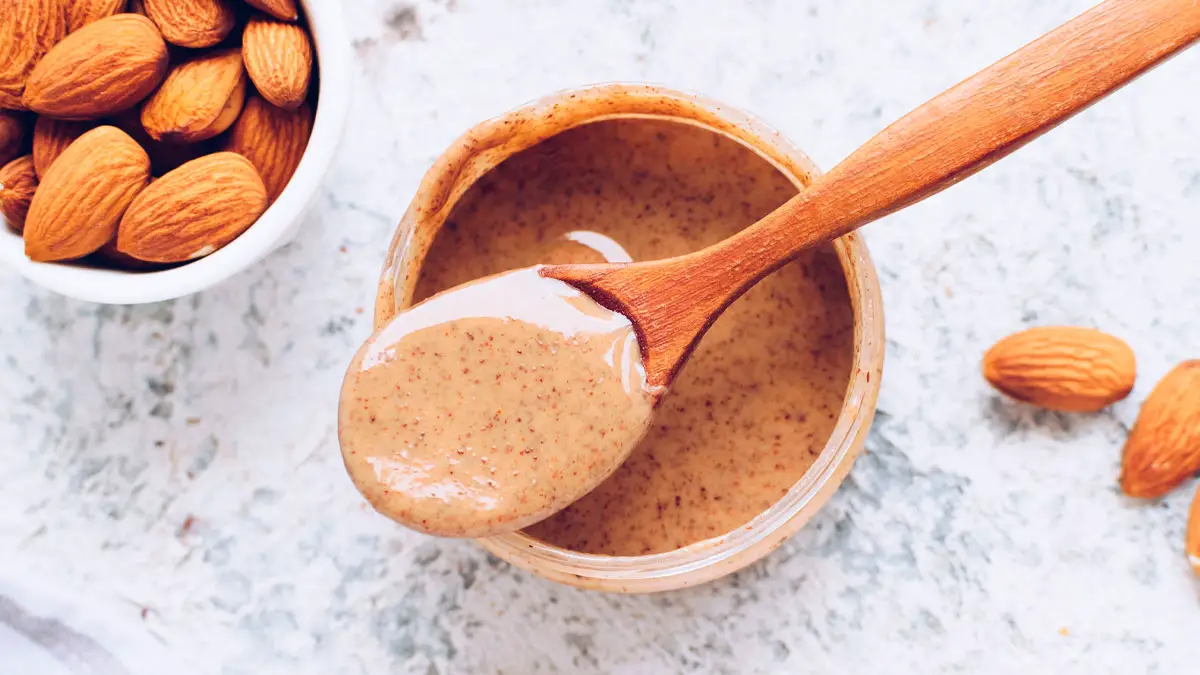This post may contain affiliate links. Please read my disclaimer.
You’ve just found the perfect almond butter recipe. You’re excited to whip up a batch of cookies, but you only have one jar of almond butter, and it’s been in your pantry for a few months. So you wonder to yourself, “Does almond butter go bad?”
The short answer is yes, like most perishable food items. In this blog post, I’ll go more in-depth, answering the question and giving tips on extending your almond butter’s shelf life.

What Is Almond Butter?
Almond butter is a spread made from ground almonds. It’s a popular alternative to other nut butter like peanut butter, cashew butter, and hazelnut butter.
Almond butter is relatively high in protein and healthy fats. It is also a good vitamin E, potassium, and magnesium source. Plus, it’s creamy, delicious, and versatile!
The Benefits
As I’ve mentioned, almond butter is packed with nutrients essential for good health. Here are some of the main benefits of almond butter:
- It’s a good source of healthy fats. Almond butter contains primarily unsaturated fats, the “good” fats that can help promote heart health.
- It’s high in protein. Just two tablespoons of almond butter contain around 7 grams of protein.
- It’s a good source of vitamins and minerals. As well as being high in healthy fats and protein, almond butter is also rich in vitamins and minerals like E, potassium, magnesium, and zinc.
- It’s low in sugar. Unlike some other spreads or breakfast foods (looking at you, jelly), almond butter contains very little sugar. Most brands only have around 1 gram of sugar per serving.
How to Use Almond Butter
Almond butter can be used in sweet or savory dishes (or both!). Here are some ideas for how to incorporate it into your diet:
- Spread it on toast or add it to oatmeal or smoothies for a nutrient-rich breakfast or snack.
- Use it for dipping fruits or vegetables.
- Stir it into soup or chili for extra creaminess (and a boost of protein!).
- Add it to desserts like brownies or cookies for a richer flavor.
- Make a healthy salad dressing by mixing almond butter with vinegar, lime juice, garlic, ginger, and soy sauce.
As you can see, it is delicious and versatile and offers some impressive health benefits.
How Long Does It Last?
Almond butter will last for about 1-2 months in the pantry and 3-4 months in the fridge. The shelf life of almond butter depends on a few factors, such as the type of almond butter and how it is stored.
For example, homemade almond butter made with raw almonds will last shorter than store-bought varieties made with roasted almonds.
Also, keeping almond butter in a cool, dark place will help it last longer. And if you’re unsure if your almond butter has gone bad, take a look (or, rather, a sniff) to be sure!
Signs It Has Gone Bad
If you’re unsure how long your almond butter has been sitting in the cupboard, there are a few easy ways to tell if it has gone bad.
- Look at the texture of the almond butter. If it has separated into oily layers or developed a clumpy texture, it’s probably past its prime.
- Smell the almond butter. If it smells rancid, it’s time to toss it out.
- Give the almond butter a taste. If it tastes off or sour, Don’t eat it!
How to Extend the Shelf Life
Almond butter is an excellent source of healthy fats, protein, vitamins, and minerals. However, almond butter can be expensive, so it’s important to ensure that it lasts as long as possible. Here are a few things you can do to extend the shelf life of your almond butter.
Store in a cool, dry place.
Almond butter should be stored in a cool, dry place like the pantry or cupboard. It’s best to avoid storing almond butter in the fridge or freezer, as this can cause the oil to separate from the solids and make the almond butter challenging to spread.
Keep it airtight.
Once you open the jar of almond butter, it’s important to screw on the lid tightly and store the jar in an airtight container. This will help keep the almond butter fresh and prevent it from getting rancid.
Avoid using wet utensils.
Use a clean, dry spoon or spatula when scooping out some almond butter. Wet utensils can introduce moisture into the nut butter, leading to mold growth.
Don’t forget to stir!
Stirring your almond butter every so often will help to redistribute the oils and keep it from going rancid too quickly.
Almond butter is a delicious and nutritious pantry staple, but it can be expensive. By following these simple tips, you can help your almond butter last longer so that you can enjoy it for weeks (or even months!) to come.
Final Thoughts
Almond butter is a type of spread made from ground almonds. It has a shelf life of around 6 months to 1 year when stored properly and can be used in many dishes.
There are a few signs that almond butter has gone bad, including rancidity, separation, and mold growth. To extend your almond butter’s shelf life, store it in a cool, dark place and keep it airtight.
Additionally, avoid using wet utensils to scoop out the nut butter, and stir it occasionally to redistribute the oils. Following these simple tips can help your almond butter last longer.
Did you find this post helpful? Let me know! I’d love to hear from you.
TIP: Pin this image below by hovering over it to save it to your Pinterest account and refer back to it later.


